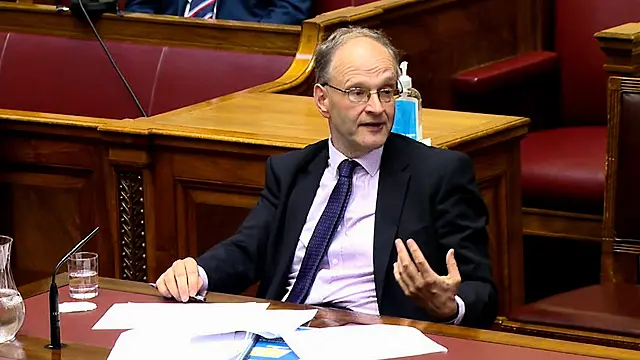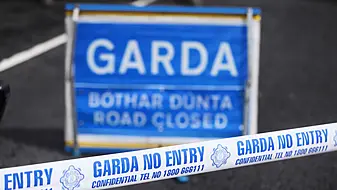Peter Weir defended the mathematical model used to standardise the results as the SDLP made a bid to recall the Stormont Assembly to address the controversy.
More than a third of A-level grades issued on Thursday were lower than teacher estimates.
Giving evidence to his Stormont scrutiny committee, Mr Weir said solely using teacher estimates to allocate A or AS-level grades would lack any level of credibility.
In 37% of cases teachers were overoptimistic in their prediction, while in around 5% of entries they underestimated the result.

Overall, the percentage of top grades allocated in 2020 was up on previous years.
However, many students have been left shocked and disappointed after receiving grades that were significantly lower than both their performance in previous exams and their teachers’ prediction.
The SDLP is seeking the support of other MLAs to secure the 30 signatures required to force the recall of the Assembly from summer recess.
The education committee did sit during recess to question Mr Weir on Friday.
During the lengthy hearing, chairman Chris Lyttle urged the minister to intervene and ensure pupils were awarded A-level grades based on either their AS-level attainment or the estimated grade assessed by their teacher.
“These are unprecedented times,” said the Alliance MLA.
Mr Lyttle said he was aware of a school that had seen its A*-C attainment rate fall from 90% last year to 60% under the calculation model.
He said the minister was “increasingly isolated” in refusing to use the teacher assessments to allocate the grades.
Mr Weir responded by insisting that if teacher predictions were used without standardisation, the results would not have “any level of credibility” because the results would be so much higher than those achieved in previous years.
He said that approach would also be unfair on pupils, as some teachers would have been “generous” in estimating grades while others had been “tough” on their students.
“There would be no equality whatsoever,” said Mr Weir.

The minister acknowledged that the system for calculating A-level results “did not work for everyone”.
He said there was no way of creating a perfect replacement for sitting the exams which were cancelled as a result of the coronavirus pandemic.
“We were looking to create what was a least-worst solution,” said the minister.
Mr Weir highlighted that a fast-tracked appeals process has been established for those students who believe they have been treated unfairly.
The standardisation model was developed by Northern Ireland exam body the Council for the Curriculum, Examinations and Assessment (CCEA).
CCEA asked teachers to give a predicted grade for their pupils and then rank them in order within their class.
The exams body then used other data to standardise the results.
For A-levels, the data included pupils’ AS-level results, making adjustments for those who had applied to take resits.
For AS results, the pupils’ GCSE results were also used, as was the performance by their school over the previous three years.
Today, SDLP have tabled a petition to recall the Assembly, to urgently address the crisis over exam grading.
Many students across Northern Ireland feel robbed of a fair chance. It is not good enough.
The Minister for Education and Joint First Ministers must be held to account. pic.twitter.com/qsiKOS7GK9— The SDLP (@SDLPlive) August 14, 2020
Daniel McCrossan, whose SDLP has urged the Assembly recall, branded the situation a “debacle”.
He expressed concern about the mental health impact on children, revealing that a GP had contacted him to alert him that three pupils who had missed out on university places had presented with suicidal thoughts.
“This model failed, it failed our children and it failed our young people,” he told the minister.
He added: “As the result of this pandemic, they should not pay the price.”
Mr McCrossan demanded more transparency on the algorithm used to calculate the grades.
In regard to the algorithm, Mr McCrossan said there was a need to “mark the minister’s homework”.
Mr Weir said he would make information on the formula public, though he stressed some of it would be technical data.
He rejected calls for an independent review of CCEA’s actions.
“I think CCEA processes were sound,” he said.
“I don’t intend at this stage to have an independent review.”

Chief executive of CCEA Justin Edwards also faced questions at the committee.
He defended the model used, insisting a range of academics and other experts were involved in its development.
Mr Edwards stressed the limited time his organisation had to deliver on the minister’s key objectives – to produce a set of results for the 2020 cohort and to ensure standards were in line with previous years.
“People have worked inordinate hours in my organisation to deliver a solution,” he said.
Mr Edwards added: “I’ve always cited that the best solution was examinations and it was not available to us.
“And, if it was not available to us, then this alternative approach was the next best operation.”
He claimed no better solution had been presented.
“If there was a viable alternative to this situation, then let it be brought forward,” he said.







